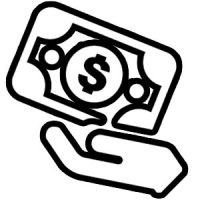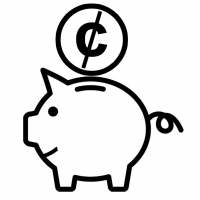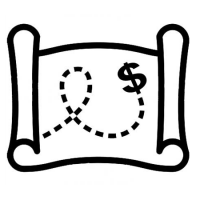Side hustles have gone mainstream with 37 percent of Americans saying they have one. That’s more than 44 million people!
Bankrate conducted the study that most young side hustlers —96 percent— say they work at their side gig monthly. Older side hustlers were pretty industrious too, with 83 percent saying this is something they do every month.
The most popular side hustles are home repair services, online sales, crafts and babysitting. A big chunk of those polled say they are doing these things —and more— for the sake of disposable income. There were others who said they need the extra money for basic living expenses, especially women, which on the one hand, I think: good for them for going for it, but bummer for them that they have to have a side job.
If you zero in on millennials, more than half of them have a side hustle. By contrast, baby boomers with side hustles were the most likely to make good money at it. People with a side hustle are making an average of $686 a month, but younger boomers pull in more than a thousand a month!
So, clearly, this is a hot trend and I’m happy to be tapping into it here on the Easy Money podcast, where we will continue to dig up and spell out creative, clever, satisfying —lucrative— side hustles that you may want to try on for size.
EPISODE 59~ Avoid That Hefty Emergency Room Bill, Here Are Ways to Save Big Bucks!
I want to talk about how to save big bucks if and when you have to go to the emergency room. It’s probably inevitable —especially if you have kids— but it doesn’t have to be ultra expensive. There are all sorts of strategies for saving, even in the midst of a tense situation. My guest is Michelle Katz, otherwise known as “Nurse Katz.” Michelle is a trained nurse, a healthcare advocate and the author of several books about saving money on healthcare, most recently, Healthcare Made Easy. Welcome to Easy Money, Michelle. Nice to have you back.
Isn’t the first way to save money on an emergency room visit not to go to the ER in the first place? How do we know whether we need the ER or Urgent Care?
If you cut your finger off, head to the emergency room. If you just CUT your finger, urgent care should probably do the trick. Or put another way, if life or limb are at risk, go to the ER. But if you have a lesser problem that you do want to be seen for, but that isn’t an emergency, maybe one of the many new urgent care centers will work for you.
OK, if you do need to go to the ER, you say take a medical bag of essentials. What should it contain? This bag should contain your doctor records, known allergies and current medications. The medical bag will help you avoid paying for things you do not need. For example, I once helped a woman named Suzanna negotiate an $8000 ER bill down to about $1500.
• She was charged nearly $300 for a pregnancy test that normally costs about $10 in a drug store.
•She was also charged close to $800 for two tests that had been given by her own doctor the previous day. The tests were $75 at her doctor’s office.
•Another charge was for medication Suzanna already had at home. The price on the hospital bill was 90 times higher than the price she’d paid for the same drug.
This is why bringing your own records and supplies can save you big money at the ER.
You also say to document everything while you’re in the hospital. Or have a loved one do it for you if you can’t. Why is this important?
Incorrect admission and release dates: The hospital staff had billed him for a bunch of procedures the day before the heart attack happened. What are they, psychic?
Misplaced decimals: At the hospital, he had been given a medication that normally costs about $87.40, but he was billed $874 for it! Often billing clerks just hit an extra digit by mistake or misplace a decimal.
Fat Fingers: This is what they call it when a data entry clerk hits the enter key too many times. In this case, I spotted a medication that was listed seven times even though it’s supposed to be given a maximum of four times daily. Any more than that would have been an overdose!
Erroneous Medications: I also noticed that my friend’s bill included a charge for pills. But he had a breathing tube in his mouth and couldn’t take pills. All meds were given via I-V.
Medical Mistakes: Finally, the hospital caused an I-V infection in his arm, and then charged for the extra day he was forced to stay because of it. Patients shouldn’t have to pay for the care required to undo medical mistakes, but it happens frequently.
This is why you should document every treatment you receive and any medications you take.
You suggest people get a copy of their medical chart. Is this their right? And what might they learn from it?
This is legally yours and it will not only help you recall some of the finer details of the event, but it also might help uncover some of the mysterious charges on your bill. Medical charts have clued me in to wrong dates, wrong times, wrong amounts, double charges, unnecessary tests and even a wrong diagnosis.
Next tip: Always ask for an itemized bill. What is this and how is it different from a regular emergency room bill?
When you go shopping and pay with a credit card, you get 2 receipts. The credit card slip just says the total amount you owe. The store receipt lists all of the individual things you bought and how much they cost. An ER’s normal bill is much like that credit card slip. It contains the total and not much more. The itemized receipt is much more like the store receipt, with all sorts of details about the exact treatments and medicines you were charged for. You want that itemized receipt so you can check it against your own documentation. Every time I have ever done this for someone, I have found errors in the hospital’s favor. Fight those and you will save hundreds or thousands of dollars.
You say to contact the billing department before they contact you. Why?
As soon as you get all of the above information and highlight what seems like an obvious mistake to you and write down your questions, pick up that phone AND ALSO contact the billing department in writing and make that appointment to go over your bill… Any delay on your part may throw your bill back onto the track to collections… Once you find someone to talk to, you can ask about your options.
You say you can ALWAYS negotiate your bill. I know that you prefer to negotiate the cost of elective medical procedures in advance. But when it comes to the ER, often we aren’t in any condition to bargain until later. Can haggling still work after the fact?
If you have a high deductible, there may be a balance even after insurance kicks in that is a tough amount to swallow. Take the time to sit down with this billing person to talk about your situation and ask for a discount. If that amount is too high, work out a payment plan that works for YOU and get your final agreement in writing. You might be surprised what you can work out if you just ask. Sometimes hospitals will accept a low cash amount to settle out your bill since setting up a payment plan can be time consuming and cost more for the hospital depending on the situation.
You may also have to negotiate with your insurance company, right? They often try not to cover things.
Yes call your insurance company to double check the information it has received from the hospital: In this process, I once discovered that one of the main reasons a patient’s insurance company did NOT pay was that somewhere in between filing the claim and capturing it, her birthdate was transcribed wrong. When you find mistakes, get them corrected and then get a reprint of the bill. Be sure your insurance company has a correct copy.
What are your last steps in dealing with an ER bill?
Once the the balance is correct and/or negotiated down, pay for it immediately and be sure to get the zero balance in writing and keep this isn your file for at LEAST a year. Then, Say thank you: I cannot emphasize this enough. It is rare that the billing department gets a thank you. So be the rarity! A simple thank you may get you an ally in the billing department that may “have your back” if something goes amiss in the future.
Michelle Katz, Healthcare savings advocate and author, thank you so much for sharing these great tips on Easy Money.
Buy Michelle Katz’s Newest Book: Healthcare Made Easy: www.amazon.com/Healthcare-Made-Easy-Questions-Affordable/dp/1440580197/ref=sr_1_2?s=books&ie=UTF8&qid=1517869802&sr=1-2&keywords=healthcare+made+easy
EPISODE 59~ Get Your State to Search By Hand For Your Unclaimed Money
Many states keep only their more recent records online, so asking for a search of older records could be just the ticket. This tip came from Steve Mondros of New Jersey who has made a hobby out of searching for unclaimed money.
Episode 59 ~ Guest Post
 An Emergency Bill Can Get Pretty Hefty, These Tips Can Save You Serious Money on Your Medical Bills
An Emergency Bill Can Get Pretty Hefty, These Tips Can Save You Serious Money on Your Medical Bills
By Michelle Katz
When Suzanne came to me after receiving her $8, 000 bill for 30 minutes in the ER almost 1 year later, she could not recall some of the events that occurred in the ER or know why her insurance was not kicking in. Who would? On the other hand, what she could recall, was helpful enough to get that bill down to about $1, 500 and this is what we did:
1. Get an itemized copy of your bill from the hospital: This is key to helping you recall events and navigate through that horrifying day. Suzanne called the billing department and made that request via the phone and email… She also told them to put her bill on hold while she was investigating the charges… This ultimately “stops the clock” on any collections, and gets the hospital involved. By doing this, you are letting them know, you are serious.
2. Get a copy of your medical chart: This is legally yours and it will not only help you recall some of the finer details of the event, but it also might help uncover some of the mysterious charges on your bill. When Suzanne and I compared this with the itemized bill we uncovered the following: wrong dates, wrong times, wrong amounts, double charges, unnecessary tests and even a wrong diagnosis.
3. Call up the insurance company to double check the information: In this process, we discovered that one of the main reasons her insurance company did NOT kick in was somewhere in between filing the claim and capturing it, her birthdate was transcribed wrong…
4. Don’t wait for the billing department to call you: As soon as you get all of the above information and highlight what seems like an obvious mistake to you and write down your questions, pick up that phone AND contact the billing department in writing and make that appointment to go over your bill… Any delay on your part may throw your bill back onto the track to collections…
5. What you don’t understand, be sure to ask: Remember that many of the people in the billing department do not have a medical background, so they might refer you to the doctor. Ask them for help if you do not know the doctor…
6. Document: After the mistakes are found get a reprint of the bill. Be sure your insurance company has a correct copy and if the balance is correct, pay for it immediately and be sure to get the zero balance in writing and keep this is your file for at LEAST a year…
7. Negotiate: If you have a high deductible like Suzanne, there may be a balance even after insurance kicks in that is a tough amount to swallow. Take the time to sit down with this billing person to talk about your situation and ask for a discount. If that amount is too high, work out a payment plan that works for YOU and get your final agreement in writing. You might be surprised what you can work out if you just ask. Sometimes hospitals will accept a low cash amount to settle out your bill since setting up a payment plan can be time consuming and cost more for the hospital depending on the situation.
8. Say thank you: I cannot emphasize this enough. It is rare the billing department gets a thank you. So one up your game! A simple thank you may get you an ally in the billing department that may “have your back” if something goes amiss in the future.
In the end we were able to get Suzanne bill down to about $1, 500 and work out a payment plan that is comfortable to her that she can afford to keep up with her other bills without going into cardiac arrest at the end of every month…
GUEST LINKS:
Twitter: @michellekatzmsn
Facebook: www.facebook.com/nursemichellekatz/
Website: about.me/michellekatz
GUEST BIO:
Michelle Katz, MSN, LPN is perhaps the most well-known healthcare advocate today. For over 15 years, Michelle has used the Healthcare for Less platform to make healthcare accessible to those who may not have thought they could afford the care they needed, as well as understandable to the general public, by addressing some of the most critical aspects of healthcare in a simpler way. Michelle has used the power of the media to help deliver the message of hope and encourage others to become their own healthcare advocates through compelling stories about real people in a wide range of financial situations effecting their health from a physical to their emotional state. She empowers families and businesses to take control of their situations by introducing the tools they need to get out of medical debt and stay out of medical debt; all steming from her own experiences with near death experiences and singlehandedly avoiding medical debt with and without health insurance. Michelle is well know for her work, helping families across the country get out of medical debt, on the “Real Money” segments of ABC World News Tonight in addition to the “Doc on a Dime” segment on The Doctors Show. She has also been quoted and used as an expert by various media outlets including CBS, FoxNews, NBC, CNN and MSNBC where she simplifies the US healthcare system while bringing facts to the listeners without political bias. In addition to being the lead resource for many media outlets on health and navigating through the healthcare system, Michelle has published three books on saving money in healthcare: Healthcare Made Easy, Healthcare for Less and 101 Health Insurance Tips. These books are all one of a kind resources, helping businesses and families navigate through the healthcare system and avoid medical debt in a way that is understandable to all.
EPISODE 58~ EASY MONEY PODCAST
EPISODE 58~ Which Frequent Flyer Program is the Best?
Financial website Wallet Hub crunched the numbers and decided that Delta Sky Miles is the best frequent flyer program, partly because it’s generous and partly because it has customer-friendly policies like points that never expire. Alaska Air and Hawaiian Airlines came in second and third. Even cooler, WalletHub created a calculator where you can plug in your own travel spending patterns and see which frequent flyer program will work best for you personally. I will link you to the report and calculator from EasyMoneyShow.com/58.
Best Frequent Flyer Program Calculator: wallethub.com/edu/best-frequent-flyer-program/25943/
EPISODE 58~ Guest Post
 A lot of people have asked me how in the world I left a lucrative 6-figure engineering career to be a full-time working musician. Well, it was hard and a lot of work, but with the proper planning, I was able to make it happen and eventually make even more money as a musician than I did as an engineer. The main thing is that I had a budget and a plan.
A lot of people have asked me how in the world I left a lucrative 6-figure engineering career to be a full-time working musician. Well, it was hard and a lot of work, but with the proper planning, I was able to make it happen and eventually make even more money as a musician than I did as an engineer. The main thing is that I had a budget and a plan.
So here I want to share the 5 things you need to do to be ready to leave your day job – follow these steps and you have your exit plan:
1. Get out of debt
If you have ANY debt whatsoever – PAY IT DOWN before you leave your steady gig. Don’t skimp on this. I am ashamed to say that I had over $20k in credit card debt as a 25-year-old but I buckled down and paid it off BEFORE I left engineering – and quite honestly, only a few months before I changed careers was it paid off.
2. Determine your minimum income
I decided that if I left engineering, I wanted to at least keep my townhouse – I refused to be a “starving artist” – so I tracked my expenses for several months and determined which expenditures were necessary and which were extravagant, and I cut the extravagant ones. Thus I began to live on *just* the necessities. THIS is what I had to do – and it worked. And to those who scoff at this truly minor sacrifice, I’ll leave you wiht Zig Zigglar’s Quote:
“The chief cause of failure and unhappiness is trading what you want most for what you want right now.” – Zig Ziglar
3. Live on that minimum income (i.e. strict budget)
And back to that note – if you are working in a profession you LOVE then you will be incredibly surprised at how much you DON’T need. Remember that we live in a consumerist economy, and “Happy people don’t spend money” (that’s MY quote).
Determine what you ACTUALLY need to get by, and stick to it!
4. Have steady work lined up that follows your passion
HOW many times have I had random people reach out to me and say “hey, I did what you did – I left my lucrative career!” … and then they had NOTHING lined up. NOTHING. They were living off their savings and with NO plan in sight.
Now, ONE of those people who had no debt but only $25k in savings) took my advice – which was to find a steady gig – until he could leave his job with a legitimate income. I’m proud to say that this friend is a successful independent artist to this day – living in LA no doubt and THAT is HARD.
5. Exit gracefully (i.e. burn NO bridges)
I firmly believe that what comes around goes around. When you have your ducks in a row and are ready to leave said lucrative career (or maybe not-so-lucrative, no shame here!), keep in mind that you may leave some of your soon-to-be-former colleagues in a VERY jealous state, so be gracious.
I remember that when I left engineering, most of my former colleagues were dumbfounded because they were actually *meant* to be engineers and couldn’t imagine any other career. But others were what I would call artist/engineers like me, and most were very supportive. But one other senior engineer actually confronted me in an aggressive manner and was asking:
“What are you doing? Don’t you have bills to pay?!? How will you afford your house?!? how can you make your car payment?!?!”
And to that I responded “Yeah, I don’t have a car payment and I live in a small townhouse with only a $600 mortgage”
But I remained calm.
Remember to be kind and gracious. AND encourage others to follow their dreams!
I hope these tips are helpful! Please feel free to contact me anytime at rebecca@topkatstudios.com with any questions – or just comment on this post!
And remember to chase your dreams!
 GUEST BIO:
GUEST BIO:
Born and raised in Alabama, Rebecca began learning to read music at the age of four. She performed in local music theatre productions and sang in choir at church, always having a lead role in any music production. Although she began reading music and picking out simple melodies on the piano, the first instrument she studied formally was the trombone, and became an all-state 1st trombonist all through Jr High and High School. She began studying classical voice at 15, and by the end of high school had won a variety of awards for vocal and trombone performance. Being an excellent student adept at computers and math, Rebecca got a scholarship to attend several schools, and ultimately choose Arizona State University and earned a degree in Engineering. She continued to study voice and began to study piano while working an as engineer full-time. She sang and played with local latin and jazz bands, and even sang with the Arizona Opera, but keeping music as a part-time job wasn’t enough. Rebecca eventually left her position as a Senior Engineer with a large defense contractor to become a full-time musician – a decision she considers one of the best of her life.
GUEST LINKS:
Rebecca’s Solo Website: rebeccadelatorre.com
Rebecca’s Band website: insurgence.com
Facebook: www.facebook.com/RebeccaDeLaTorreMusic
Twitter: twitter.com/topkittykat
Instagram: www.instagram.com/topkittykat/
You Tube Channel: www.youtube.com/user/topkittykat
EPISODE 58 ~ MAKE MORE: Turn Your Passion for Music into a Lucrative Career
Is music your talent and your passion? If so, I’m here to tell you that it IS feasible to make money as a musician. From playing weddings on up to recording and selling your own albums, it’s all possible. And it’s our featured “make more” segment of this podcast. My guest is Rebecca De La Torre, a singer, songwriter, pianist and savvy business woman. Welcome to Easy Money, Rebecca.
Since you’re a performer, let’s set the stage. You come from a musical family and yet you were encouraged to be more practical in your career. Do I have this right?
I was always a singer. Started to read music in preschool. My grandmother is piano teacher and professional pianist. Everyone in my family plays an instrument or did at one time. I played trombone in hs and wanted to go to school for music but was encouraged to do that as hobby. I was good at computers and so I went into computer science/engineering.
In fact, you got your degree in electrical engineering and you landed a prestigious job at a major defense contractor, right?
Ten years ago I left a full time engineering job making $102,000 to do music full time. I was working on my PhD in electrical engineering at the time and only making about $600 a month playing piano and singing at churches in town. I realized if I was a full time scientist then music will always be my hobby and that scared me. So I dropped everything and decided I wanted to do music full time. I started planning how to get out.
Don’t tell us yet how much you make now in music. We’ll save that for later. But do tell us the first job you got in music and what it paid.
I speak Spanish and decided to get a job at a church. There was a church 7 miles from me in Mesa, AZ. Music Director job became available. Job paid $36,000 – went from $102,000. But I did it.
It may sound to people like you leaped before you looked, but that’s not the case at all. You had a plan. What was it?
The first year I made $40,000 but then I kept growing it. I realized I needed private events and to advertise and put videos and recordings online so people would see what I could do. I still made about $40k my first year as a musician because I set a BUDGET and had a PLAN that I stuck to.
A strict budget is important for you and something you would recommend to other musicians and creatives, am I right?
I have no debt besides my mortgage and I NEVER buy something I don’t have cash for. This is SO crucial to being a successful business?person. One time I had $20,000 in credit card debt. I DID used to have debt, but I paid it off BEFORE leaving engineering – so I’ve made that mistake, too. Back in the day I bought stuff I didn’t have money for. Not any more! I don’t have the latest fashion. I cook rather than eat out. I don’t live extravagantly. I don’t spend what I don’t have.
In fact, because you’re frugal AND because you’ve learned ways to make money as a musician, today you own several properties and have the luxury of splitting your time between 2 different cities, right?
As of right now I own 4 properties in 3 states. My job and the money I make allows me to leave town for the summer. It allows me to be a sunbird and get out of this heat in the summer. It allows me to make my own schedule but I work a lot.
We’ve got their attention now! So what are your revenue streams as a musician?
- I still have my small salary as music director at a church, which pays the mortgage and groceries.
- I perform at private events.
- I do live shows
- I sell albums at my live shows all the time.
- I have also sold albums online but I’m still trying to figure all that out.
- I write music for other people’s lyrics.
- I perform at wedding ceremonies and receptions. At one times weddings were 30% of my business. Now about 20%.
I know you love it, but is it easy or hard to make a living as a musician?
It’s not easy money. It’s not easy. You have to hustle. It’s not for everyone. I think there are certain personality types that are good for it. You need to be resourceful. You need to be outgoing or have someone on your team who is outgoing. If you can do anything else, anything else in the world to make a living and be happy then do that because music is that hard. But if you have to do something with music, then be ready to work every day, master your instruments. Be humble. And always promote yourself.
How do you promote yourself as a musician?
I mainly use the internet and social media for building up my community of fans, promoting my gigs, and advertising for private events. In this day and age it’s all about the connection economy. People want to feel connected to where they spend their time.
So you’ve stitched together a career combining your own music and other people’s music, your own gigs and gigs for hire. Now, the big question: What kind of money are you able to make at it, Rebecca? And, thank you in advance, for being direct about this because it’s an inspiration to others.
Five years in I started making over six figures gross. Las year I grossed $106,000 with my music business.
Wow, 6 making 6 figures as a working musician, that is going to be a revelation to people. And yet, you say, try NOT to be a musician! Why?
If you can do anything else, anything else in the world to make a living and be happy then do that because music is that hard. But if you have to do something with music, then be ready to work every day, master your instruments. Be humble. But always promote yourself.
Well, Rebecca De La Torre, singer, songwriter, pianist and musician who actually makes money at it, it’s been my pleasure to promote you a little bit. And thank you for sharing your knowledge with my listeners on Easy Money! And folks, I will link you to Rebecca’s website, her You Tube Channel and so on, where you can hear more of her music. Just go to EasyMoneyShow.com/58 for those links.
EPISODE 58 ~ On the Market for a New Home? Check Out Foreclosed Property!
Thousands of homes will become available for sale through foreclosure this year —or any year. And while it’s a hardship for the families who lose their homes, it can be an opportunity for others to buy a house at a bargain. It’s sort of the cycle of life.
When a lender forecloses, it’s no reflection on the home. It just means the previous owner couldn’t make the mortgage payments. There are two main junctures at which you can purchase a foreclosed property: on the courthouse steps when it is being auctioned off to satisfy the debt owed to the mortgage company. Or after that same bank has bought the property back itself in order to recoup its investment. This second is known as a bank-owned or “real estate owned” property and is actually more common.
You hear the phrase “auctioned on the courthouse steps” frequently, but the truth is, not all courthouses have steps and not all of these auctions are conducted at courthouses! Some states hire professional auctioneers and ask that the auctions be held at the auctioneer’s office. Others allow them to be held on the premises of the property they’re selling. Other options: some auctions are run by the local sheriff’s office and others are handled by attorneys. I’m going to refer to ALL of these as courthouse-steps scenarios.
If you are hoping to buy a property in a courthouse steps scenario, where the bank is repossessing the home from the mortgagees, it’s a good idea to attend several auctions and get a feel for how they work before you actually bid. Keep in mind that many –even the majority—of these auctions are canceled at the last minute when the homeowners somehow work out a deal with the bank to stay in their home. So try to re-check listings before heading to the auction site. You should also know, that even for a courthouse-steps scenario, you are allowed to hire a real estate agent to represent you. Just be sure to choose one with experience in this unique subset of the realty world.
Typically you cannot get inside to see the property when buying from the courthouse steps, but here is one helpful hint: if the property changed hands in recent years, there may still be photos and details archived in the Multiple Listing Service that real estate agents have access to or on a real estate website like Zillow. So check.
Now let’s talk about bank-owned properties, where the bank has already bought the foreclosed house itself. You should know that banks are not required to disclose defects in the property in the same detail that regular sellers are because they have not lived in the home. It’s important to hire an expert home inspector to look for expensive flaws.
Nearly all bank-owned properties are listed on an as-is basis. That means the bank is stating it will not repair defects to the property. If you find flaws, you should lower your offer accordingly. Alternatively, if the property has been sitting around for awhile, even though the bank has listed it “as is,” the bank may be willing to pay for repairs in order to get the home off its books.
It’s best to approach any home purchase with your own pre-approved financing in place, but since you are dealing with a bank, it is quite possible that they will want you to get pre-approved by their own mortgage department as well. Some banks selling properties will actually offer to provide you a mortgage for a property. It’s a fine idea, as long as you have shopped around elsewhere and know you are getting a good rate and fees.
Industry experts say bank-owned properties are already marked down 20% to 30% compared to other homes in the neighborhood, so you may not have much luck making a lowball offer. However, if the home has been on the market a long time, your chances are better of talking the price down. Still, when Zillow analyzed the closing price of regular homes versus foreclosed homes, it found that you can get a discount of 7 to 27 percent on a foreclosed home. And when you’re talking about big numbers, those percentages are real money!
EPISODE 58~ Could You Have Unclaimed Money From Utility Deposits?
Now, if you live in a place for a while, it’s easy to see how you might forget that you put up this chunk of money, a utility deposit, all so you could stay warm or cool or take showers. Some people put down a deposit for home phone service too, but I hesitate to even mention that because it sounds so quaint. Anyway… utility deposits are a common form of unclaimed money. You get a new job offer or a new apartment and are so wrapped up in moving tables that you leave money on the table. So, think back, did you ever pay a utility deposit? Better yet, just do a quick search and see. Your utility has to turn this money over to the state where you live or lived after 3 to 5 years. As always, you can search 40 states for free by going to MissingMoney.com. You can search the other 10 at unclaimed.org. Yes, .org. If you find a lost utility deposit, please will you share the good news? I look forward to hearing from you.
Search for your unclaimed money: missingmoney.com
Find your unclaimed property: www.unclaimed.org





